[ad_1]
After Russia’s invasion of Ukraine and the turning off of Russian gasoline to Europe, there was panic that there wouldn’t be enough pure gasoline—or methane, as we want to call it—to get by means of the winter. European worldwide areas immediately started ordering all the liquified pure gasoline (LNG) they could get their arms on; LNG imports are up 65% over 2021.
In actuality, on the time of writing, dozens of LNG tankers are floating spherical Europe on account of there is not going to be enough ports with “regasification” functionality to unload all of them. However as well as, on account of warmth local weather in Europe has lowered demand for gasoline and the value has dropped. “Higher than 30 tankers holding liquefied pure gasoline are floating merely off Europe’s shoreline as energy retailers wager the autumn price reprieve prompted by sturdy gives and warmth local weather will present to be fleeting,” tales the Financial Events.
In response to Marine Notion: “There are over 35 LNG-loaded vessels that are drifting throughout the Mediterranean, off Spain, with eight ships anchored off the Bay of Cadiz; analysts, retailers, and sources associated to the LNG terminals are accustomed to the state of affairs talked about on Monday. The cargo backlog has reportedly raised alarming points referring to Europe’s performance to course of LNG gives required to compensate for the dearth of Russia’s pipeline present.”
Ainun Rahmania and Widodo W. Purwanto
All these ships merely sitting spherical and able to unload are exacerbating a elementary downside with LNG: boil-off gasoline (BOG). That’s the discharge of methane into the setting as a result of the tanks warmth up, along with the losses when loading and unloading LNG on the ports. In response to at least one study, “Simulation of Boil-Off Gasoline Influence Alongside LNG Present Chain on Quantity and Top quality of Pure Gasoline,” a superb portion of a typical tanker’s load boils off.
“The LNG storage tank has insulation, however it certainly cannot current good insulation. Subsequently heat from the environment slowly impacts the tank, which causes the LNG to evaporate and produce the gasoline, usually referred to as boil-off Gasoline (BOG). BOG inside the LNG present chain occurs inside the storage tank, the tactic of loading and unloading, and as well as in the midst of the transport…The outcomes current 2,966 m3 of BOG occurred inside the LNG loading course of, corresponding to 2.7% of complete LNG carried. For the transport course of, 4,118 m3 (4%) of the remaining LNG turns into BOG and a pair of,545 m3 (2.63%) of the remaining LNG inside the unloading course of.”
That’s 9.33% of the gasoline, an entire of 9629 cubic meters of methane gasoline leaking into the setting from a ship carrying a load of 126,500 cubic meters. Within the meantime, primarily based on one different study, “The boiloff cost of an LNG cargo for a very loaded supplier is usually 0.1 to 0.25% of complete amount per day.” So if these ships sitting spherical Europe are concerning the equivalent dimension, that’s 316 cubic meters per day per ship.
Totally different analysis put the BOG at lower ranges, at 5% of the cargo, nevertheless that is nonetheless an unlimited amount given the amount of LNG being shipped world broad. And whereas the commerce and analysis declare that “pure gasoline is the cleanest fossil gasoline, which is hottest and economical after crude oil” and “liquefied pure gasoline is actually essentially the most economical technique of transporting NG over prolonged distances,” they in no way describe the BOG as methane leaking into the setting, which it largely is.
As Treehugger has well-known before now, “On account of chemical bonds inside its molecule methane is fairly extra setting pleasant at absorbing heat than carbon dioxide (as lots as 86 cases additional), making it a very potent greenhouse gasoline.” Switching from piped gasoline to LNG is rising methane emissions by between 5% and 10%. However, primarily based on the BBC, there are plans afoot to assemble 20 new LNG terminals in Europe, predominant to a special phenomenon: lock-in.
“It’s really scary to be honest,” Eilidh Robb, who’s with Mates of the Earth Europe, knowledgeable the BBC. “The issue is that to make these terminals economically viable, worldwide areas want to adapt to very prolonged contracts to usher within the gasoline and the terminals themselves can final so long as 40 years, which suggests a very prolonged lock-in influence for these fossil fuels that we attempt to get out of.”
Peter Erickson, Michael Lazarus and Kevin Tempest /CC BY-NC 3.0
We have got checked out lock-in sooner than, quoting a study, Assessing Carbon Lock-in:
“Carbon lock-in is an occasion of the phenomenon of path dependence—’the tendency for earlier alternatives and events to self-reinforce, thereby diminishing and doubtless excluding the prospects for alternate choices to emerge…Significantly, carbon lock-in refers again to the dynamic whereby prior alternatives concerning GHG-emitting utilized sciences, infrastructure, practices, and their supporting networks constrain future paths, making it more durable, even unimaginable, to subsequently pursue additional optimum paths in direction of low-carbon targets.”
Our conclusion then was identical to the one given by Paul Balcombe of the Queen Mary School of London to the BBC: “We now have to enhance energy effectivity and our renewables deployment. Fairly than merely attempting on the really, really short-term substitute, which is LNG, we’ve got to take a look on the marginally long run, which can have means increased value implications, financial and environmental.”
As an alternative of investing in extra LNG infrastructure, every on the receiving side in Europe and the manufacturing side in Canada and the U.S., we’ve got to chop again the demand for gasoline. Which suggests insulating our properties and buildings—not our LNG tanks.
[ad_2]
Provide hyperlink
